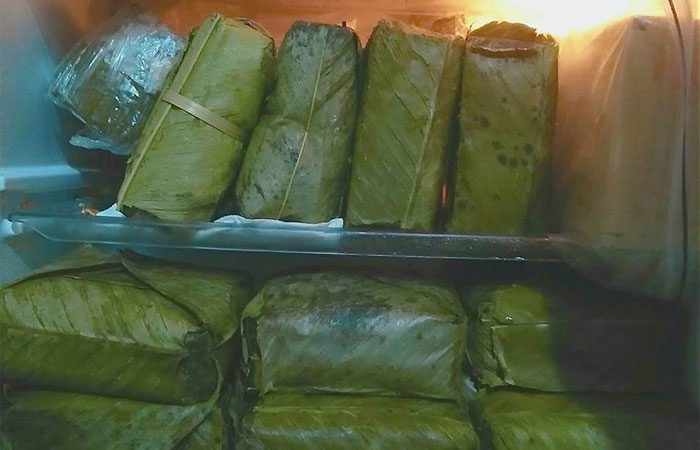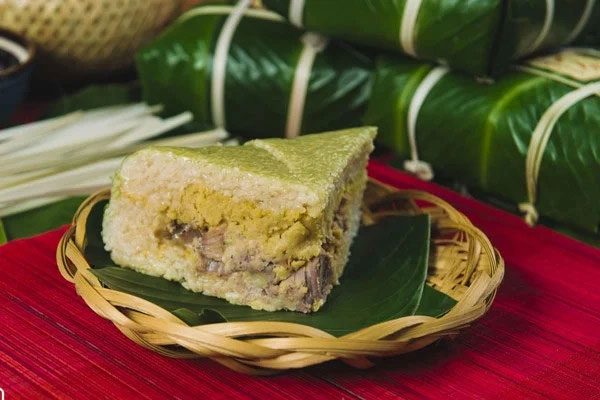There is no solid evidence that storing bánh chưng in the freezer can cause cancer. However, improper food storage conditions can lead to bacterial growth, which may be harmful to health.
Can Eating Bánh Chưng Stored in the Freezer Cause Cancer?
Every Tết (Lunar New Year), Vietnamese families have the tradition of making large quantities of bánh chưng and then storing them in normal conditions; or more carefully, placing them in the freezer, so they can be defrosted when needed.
According to health experts, bánh chưng is best enjoyed within about a week, depending on the storage conditions. When refrigerated, it should be kept at a temperature of 5-10 degrees Celsius in the cooling compartment.
There is information suggesting that the habit of storing bánh chưng in the freezer for an extended period may lead to cancer. The reasoning is that while the bánh chưng may still taste good when eaten after being frozen, the components of the bánh change over time, potentially causing harm with prolonged consumption. Starch, after being frozen, undergoes changes that disrupt its structural components. When frozen, cellulose may decompose into toxins that can cause cancer in humans.

Bánh chưng is best enjoyed within about a week, depending on storage conditions.
In light of this information, many families feel confused as many still have leftover bánh chưng after Tết. Leaving bánh at room temperature poses a clear risk of spoilage, but does freezing them really carry a risk of cancer? Notably, many families have had this storage habit for years. Should people continue to store bánh chưng in the freezer?
Food Technology Experts Weigh In
In response to the concerns regarding the risk of cancer from storing bánh chưng in the freezer, Assoc. Prof. Dr. Nguyễn Duy Thịnh from the Institute of Biotechnology – Food Technology, Hanoi University of Science and Technology, stated, “This is unreasonable. There is no such thing.”
The expert explained that bánh chưng is a combination of many delicious and nutritious ingredients such as meat, mung beans, and sticky rice. Thus, this dish is very tasty and nutritious unless it has spoiled.
To preserve bánh chưng, it can be kept in cool, clean places or placed in the refrigerator (5-10 degrees Celsius), which is also very effective. This method helps to extend the shelf life of bánh chưng. However, the refrigerator temperature can only inhibit bacterial growth, slowing down their reproduction but not killing them. When microorganisms proliferate sufficiently, bánh chưng in the refrigerator can still show signs of spoilage, such as mold, rot, or decay… Bánh chưng stored in the refrigerator typically lasts only about a week.
Another way to preserve bánh chưng for longer is to keep it in the freezer, where the temperature is usually around -18 degrees Celsius.
“At this temperature, microorganisms can hardly survive, so there is no reason for the nutrients in bánh chưng to change. If we say it changes, we must clarify what it changes due to. Changes must be due to biological or chemical reactions… it’s not just something we can imagine. Bánh chưng is a processed food, so it will spoil only due to the rapid growth of microorganisms. Additionally, freezing does not alter starch or nutrients,” Assoc. Prof. Dr. Nguyễn Duy Thịnh analyzed.
According to the expert, whether bánh chưng can be preserved well or not also depends on the hygiene practices during the wrapping, cooking, and storing processes. The leaves used for wrapping should be thoroughly washed and dried. The wrapping process should not be too tight or too loose. When cooking, it is essential to ensure the bánh is evenly cooked. After removing the bánh from the pot, rinsing it with clean water to remove any remaining water or sliminess from cooking will help prevent rapid spoilage, especially in hot weather. Next, it should be covered with a tray or plastic wrap and weighed down with something heavy.

Bánh chưng can be stored in a regular freezer.
When storing in the refrigerator, maintain a temperature of 5-10 degrees Celsius. Cut only what you need to eat, and wrap the remaining part tightly in plastic. If the bánh shows signs of hardening (becoming tough), it should be boiled, fried, or steamed again before consumption. Bánh chưng kept in the refrigerator can last 7-10 days.
Additionally, the expert warns that if the bánh shows signs such as leaking, an off smell, sliminess on the surface, or mold, it should not be cooked again but rather discarded, as bacteria may have invaded, spoiling the bánh.
Families can safely store bánh chưng in a regular freezer. However, it is essential to ensure that the freezer temperature remains stable at -18 degrees Celsius. The best practice is to keep bánh chưng in the freezer for no longer than one month.


















































